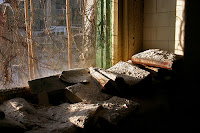 Will Richardson's text, Blogs, Wikis, Podcasts, and other Powerful Web Tools for Classrooms has me thinking about public education's current logic regarding literacy. English/language arts teachers are forever known for their love of literature--lit jocks, if you will--but I question whether this ideology is not only somewhat ill-fitted for our current population of students so saturated in hyper-media, but whether it's a pipe dream altogether to think that the solitary, "a room of one's own" type reader can exist unplugged. Meaning, while there is a world of hypertext flooding the world outside of schools, our classrooms, packed with all the dusty classics, are really serving our students/ citizens. Yes, literature moves metaphysical mountains. Yes, literature provides an escape door for nightmare lives. Yes, literature is the stuff of revolutionaries. But literature also has become increasingly associated with stagnation, recalcitrance, authority. Of course, this is more the product of a limiting method of delivery rather than the literature itself.
Will Richardson's text, Blogs, Wikis, Podcasts, and other Powerful Web Tools for Classrooms has me thinking about public education's current logic regarding literacy. English/language arts teachers are forever known for their love of literature--lit jocks, if you will--but I question whether this ideology is not only somewhat ill-fitted for our current population of students so saturated in hyper-media, but whether it's a pipe dream altogether to think that the solitary, "a room of one's own" type reader can exist unplugged. Meaning, while there is a world of hypertext flooding the world outside of schools, our classrooms, packed with all the dusty classics, are really serving our students/ citizens. Yes, literature moves metaphysical mountains. Yes, literature provides an escape door for nightmare lives. Yes, literature is the stuff of revolutionaries. But literature also has become increasingly associated with stagnation, recalcitrance, authority. Of course, this is more the product of a limiting method of delivery rather than the literature itself. I like to think of literature on the same playing field (play read as analysis, communication, etc.) as various other texts students come in contact with. The note--a minor, but necessary act of communicative sedition?--passed around the class under the oblivious teacher's nose. Text is text is text is text. Hard to swallow, I know. Particularly when students hear this from the teacher h/erself. We ought to be raising communicators, decipherers of meaningful language before attempting to indoctrinate them into the secret society of lit. jocks.
Blogs will be a part of my students weekly routine. They will be engaging in a community of readers/writers. This is a break away from the traditional modes of discourse we are asking students to engage in. As Richardson puts it, "The differences between blogging in this manner and writing as we traditionally think of it are clear: Writing stops; blogging continues. Writing is inside; blogging is outside. Writing is monologue; blogging is conversation. Writing is thesis; blogging is synthesis" (31). We as English teachers are caught up in the five-paragraph essay genre and are probably either too scared of technology or too comfortable with our routine to incorporate what appears to be a messy product. There may be some difficulty getting students to understand the difference between the journaling they do on their MySpace pages, or the traditional essay format covered in class and the act of blogging. Again, this is not to say that one genre supersedes another. But aren't we doing a disservice to our students if we champion academic writing as though it is the end-all of communication and neglect the many range of discourse communities students could be engaging in?

No comments:
Post a Comment